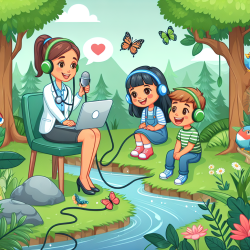Introduction
As speech-language pathologists, our primary goal is to enhance communication skills in children. However, mental health is an integral part of this process, influencing both learning and communication. A recent research article, "Nature and Mental Health: An Ecosystem Service Perspective," published in Science Advances, provides compelling evidence on how nature experiences can significantly benefit mental health. This blog explores how practitioners can incorporate these findings into their therapeutic practices to improve outcomes for children.
The Research Findings
The study highlights the profound impact of nature experiences on mental health, emphasizing improvements in cognitive functioning, emotional well-being, and overall mental health. It suggests that interactions with nature can reduce stress, enhance mood, and even improve attention and memory—key areas that speech-language pathologists often target in therapy.
According to the research, nature experiences can be as simple as viewing images of nature, listening to nature sounds, or spending time in green spaces. These interactions can be integrated into therapeutic sessions to create a calming environment that supports mental health and learning.
Implementing Nature in Therapy
Integrating nature into speech therapy sessions can be done in various ways:
- Virtual Nature Experiences: Utilize digital platforms to display images or videos of natural environments during online therapy sessions. This can help create a soothing backdrop that aids concentration and reduces anxiety.
- Nature Sounds: Incorporate recordings of nature sounds, such as birdsong or flowing water, into therapy sessions to create a calming auditory environment.
- Outdoor Sessions: When possible, conduct therapy sessions in outdoor settings like parks or gardens. The natural environment can provide a rich context for communication activities and enhance engagement.
Encouraging Further Research
While the current research provides a strong foundation, there is a need for further studies to explore the specific impacts of nature experiences on different aspects of speech and language development. Practitioners are encouraged to collaborate with researchers to investigate these effects, contributing to a growing body of evidence that supports the integration of nature in therapeutic practices.
Conclusion
Incorporating nature into speech therapy not only enhances mental health but also enriches the therapeutic experience for children. By leveraging the benefits of nature, practitioners can create more effective and holistic therapy sessions that support both communication and mental well-being. To read the original research paper, please follow this link: Nature and mental health: An ecosystem service perspective.










